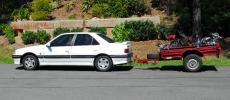Trailers that drink fuel
 Most cars that I have owned have had tow-bars – if they’re not on the car when I buy them, I have them fitted.
Most cars that I have owned have had tow-bars – if they’re not on the car when I buy them, I have them fitted.
So the EF Falcon and Lexus LS400 both had towbars. And, as you’d expect with those cars’ mass and power, both towed very well. On one occasion the Lexus towed a camper trailer, and it very often towed my 6×4 steel trailer. The Falcon towed the 6×4 and once a car-carrying trailer (loaded with a large work bench frame).
So when both of those cars had gone to new owners and I bought the Peugeot 405 diesel, I was pleased to see it had a towbar.
I didn’t – and don’t – expect to be towing big trailers; instead, my 6×4 will be the one usually hung on the back. Trips to the local tip, trips to pick up furniture, carrying around recumbent trikes – things like that.
But as a tow-car, the low-powered and light Peugeot is a very different kettle of fish to the Lexus and Falcon. For starters, the lack of ultra-low rpm torque (when the 1.9 litre diesel is yet to come on boost) makes it very hard to climb my very steep driveway with the trailer on the back. In fact, to do this, I need to thoroughly warm the engine and launch with a lunge at the slope.
Once on boost, the mass of the trailer doesn’t cause much of a problem; performance is clearly down but with decent driving, it’s no drama.
But one aspect of the Peugeot as a tow car amazes me. And what’s that?
The fuel consumption!
The presence of the trailer makes a radical difference to have much diesel the Pug drinks. Even with the trailer empty, consumption is up by 20 – 30 per cent. One reason for this is that the trailer adds about 25 per cent to the mass; another reason is that the trailer is much less hidden in the aerodynamic wake of the smaller car.
Clearly the idea that towing a trailer increases fuel consumption is not something new.
However, as more people drive cars like hybrids (incidentally, no Prius is factory certified for a tow bar) and smaller engine diesels, trailers designed with more than utilitarian cheapness may become attractive. A smaller, light-weight and aero-shaped trailer would, I’m sure, make far less difference to the Peugeot’s towing fuel consumption…

 Julian Edgar, 50, has been writing about car modification and automotive technology for nearly 25 years. He has owned cars with two, three, four, five, six and eight cylinders; single turbo, twin turbo, supercharged, diesel and hybrid electric drivelines. He lists his transport interests as turbocharging, aerodynamics, suspension design and human-powered vehicles.
Julian Edgar, 50, has been writing about car modification and automotive technology for nearly 25 years. He has owned cars with two, three, four, five, six and eight cylinders; single turbo, twin turbo, supercharged, diesel and hybrid electric drivelines. He lists his transport interests as turbocharging, aerodynamics, suspension design and human-powered vehicles.

on January 22nd, 2008 at 7:15 am
Julian, I’ve occassionally towed a light boat trailer with a very light, streamlined sailing dinghy on it with a Citroen GS. It still murdered the fuel economy. Streamlined cars don’t really have a “wake” to hide the trailer in.
I’ve never seen any studies, but I bet the mudguards on most trailers contribute about 50% of the aero drag. Maybe you could try fairing yours in?
on January 22nd, 2008 at 8:17 am
Newlite make a range of lightweight trailers for motorbikes. Very minimalist in design and some even fold up for easy storage.
http://www.newlite.com.au/cmtimages/26.jpg
on January 22nd, 2008 at 8:57 am
I am surprised that when people downsize a car many do not buy a handy station wagon. However not many medium or small sized wagons are on offer.
on January 22nd, 2008 at 1:01 pm
The trailer is the same mass whether its hooked onto the back of a Falcon or a Peugeot. Sure it adds a bigger PERCENTAGE to the Peugeot’s fuel consumption, because it consumes less, but does it add a bigger AMOUNT?
on January 22nd, 2008 at 3:45 pm
The issue here is compounded by the effect of the extra torque at typical speeds on moving the engine operating point within the engine operating torque-rpm curve.
Basically fuel consumption in urban travel varies with the vehicle mass except for hybrids. This is because fuel is used to give the car speed and kinetic energy which is mass by the speed squared. and then that energy is used up mostly as heat everytime we apply the brakes.
The Peugeot 405 weighs around 1250 kg with a driver and the Falcon around 1500 kg with a driver, so in urban travel we would expect the peugeot to use about 17% less fuel. And on http://www.greenhouse.gov.au/fuelguide/ we find for urban travel the Peugot uses 11.5 litres / 100 km and an EF falcon about 12.5 litres per 100 km or about a 10% difference.
If you add a 250 kg trailer then the fuel consumption of the Peugeot would be expected to increase by around 20%, and for the Ford around 17%.
BUT in addition there is the “sweet spot” effect. If the extra torque required because of the extra load still leaves the operating point within the sweet spot, then the figures above will be correct. But if it moves to a point where the specific fuel consumption per kWhr has increased by say 10%, then the Peugeot fuel consumption will increase by 25% x 110% or 27.5%.
I had a dual fuel Statesman whose engine was obviously optimised for unleaded petrol. Towing a trailer while running on petrol led to expected increases in petrol consumption. But running on gas the fuel consumption increase was much higher reflecting the engine was not optimised for LPG and the extra torque required due to mass and drag was moving the operating point well outside the sweet spot.
on January 22nd, 2008 at 4:12 pm
Urban fuel consumption for Pug is listed at 7 litres/100km. It’s a diesel.
on January 22nd, 2008 at 6:52 pm
‘Urban fuel consumption for Pug is listed at 7 litres/100km. It’s a diesel.’
So what. The maths are still the same.
on January 22nd, 2008 at 7:37 pm
“And on http://www.greenhouse.gov.au/fuelguide/ we find for urban travel the Peugot uses 11.5 litres / 100 km and an EF falcon about 12.5 litres per 100 km or about a 10% difference.”
This is wrong – the difference is 44 per cent. I was making the correction.
on January 22nd, 2008 at 8:34 pm
Hi All
I now live in country Victoria and when I tow my 8×5 trailer on the highway behind my 260z (2,8 EFI engine) the fuel consumption goes up about 25~30%, I didn’t really notice this when i was living in Melbourne ?
Colin
on January 23rd, 2008 at 2:44 pm
It is well-known how drafting affects the leading vehicle. Its interesting that no-one has made a trailer canopy that tries to clean up the airflow off the back of the towing car, minimise the “hole in the air” the two make, and reduce highway fuel consumption. I guess the problem is that it’d only work optimally for a particular combination of car and trailer. But there might be some benefits that could be obtained in a generic car with generic box trailer. I’d expect there’d be the most benefit with a hatchback, wagon or van. Or a truck with a container-shaped load.
on January 27th, 2008 at 12:52 pm
The mass of the trailer won’t be so important once up to speed on the highway, but for wind resistance I can’t think of anything worse than an empty box trailer. Effectively, you are towing two flat plates through the air, each with a Cd of 1.0! The mudguards on these things are also pretty dreadful from an aerodynamic point of view. The effect will be worse the more aerodynamic the tow car becomes (say Cd = 0.3 or less). You are effectively towing a small parachute.
on January 29th, 2008 at 7:23 am
I live in British Columbia province in Canada and love this website! In depth technical articles, how to’s, car tests without bias. Fantastic!
I own a 2005 Pontiac Vibe (same as a Toyota Matrix) with a 1.8L 4speed autobox. My trailer is 80″ (2.032m) wide and 140″ (3.556m) long and i built it with an angled front (23 degrees). I have pulled it through our mountains a distance of 500 miles (800km) and have the fuel reciepts to prove my mileage dropped only 6% total (to my destination unloaded, from with about 800lbs (364kg) load). This is truly great and i am very pleased with the vehicle and trailer.
on March 9th, 2008 at 12:23 pm
I have towed a 7×4 box trailer with 18 inch tall sides carrying about 550 lbs of camping gear with a 12ft dinghy inverted on a close rack, the bow only about 18in behind the boot of my 4.1 manual XF Falcon.The trip was about 450 miles,mainly open country,and I was expecting a considerable increase in fuel usage but was surprised by the small difference from a previous trip, no trailer.
Obviously the boat[aly]was slipstreaming the car and minimising the drag of a no longer blunt nosed trailer.
Conclusion=always tow a trailer with a dinghy clamped on top.
on October 8th, 2008 at 9:38 am
I recently towed an A’Van A’Liner folding caravan with a Peugeot 307 2.0L HDi turbo-diesel. My average fuel consumption while towing for 6,000 km was 7.3L/100km (39mpg) with a best of 6.4L/100km (44mpg). This was measured using the trip meter and filling up the same way each time. I used cruise control most of the time and it was set at 90kph.
on January 15th, 2009 at 1:18 pm
See http://www.easytrailer.com.au for a lightweight alternative that offers very low road drag and a multi function design, folding models also available.